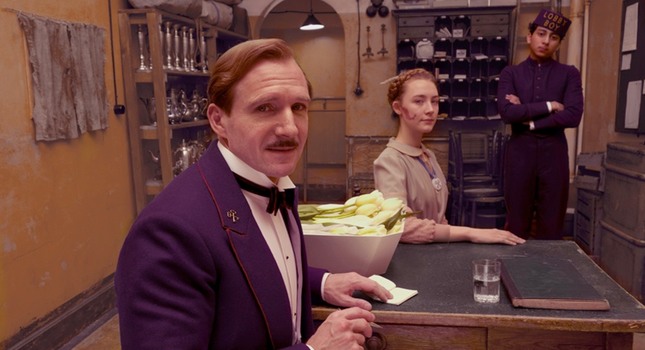
The movie is Wes Anderson’s latest tour de force of cinematic genius, following up on the equally brilliant Fantastic Mr. Fox and Moonrise Kingdom. As you’d expect with any Wes Anderson film, The Grand Budapest Hotel has his trademark unique visual style and this is added to by significant inspiration taken from the design characteristics prevalent during the Belle Époque.
Added to the incredible charm of the look and feel of the film, is an equally charming storyline, cleverly wrapped in a storyline and tied off with yet another storyline. Inspired by the writing of Austrian novelist, playwright, journalist and biographer Stefan Zweig, it’s evocative of a time long gone by, giving it a lot of nostalgic nuances, while recognising the importance of letting go of the past.
It starts out as the story of a girl that finds a book in a cemetery, before quickly segueing into the story of the book she finds, which is itself the story of the author’s notion that when you’re a writer, great stories come to you. To demonstrate this he recounts a story about his introduction to the owner of The Grand Budapest Hotel, Zero Moustafa, who tells him his life story, how he came to acquire his fortune and about his friendship with the former concierge of the hotel, Mr. Gustav H.
The interweaving complexity of the plot makes for a lot of fun keeping up with as the movie introduces a massive array of incredible characters. While it’s incredibly funny throughout, it’s also very smart as it keeps coming back to the central theme around the importance, impact and power of storytelling that holds it all together.
Wes Anderson seems to collect cast members like a loyal commandant, who’s been building a little army of devoted legionaries to take his quest for cinematic perfection to the big screen for him. The cast in The Grand Budapest Hotel is probably the biggest we’ve ever seen from the director, bringing together a lot of faces from his previous movies, including Bill Murray (The Life Aquatic with Steve Zissou), Owen Wilson (Fantastic Mr. Fox), Jason Schwartzman (The Darjeeling Limited), Edward Norton (Moonrise Kingdom), Jeff Goldblum (The Life Aquatic with Steve Zissou), Harvey Keitel (Moonrise Kingdom), Willem Defoe (Fantastic Mr. Fox) Tilda Swinton (Moonrise Kingdom) and Adrien Brody (The Darjeeling Limited).
They’re added to by some new avant-garde soldiers in the Anderson vision, ranging from relative movie newcomer Tony Revolori as the young Zero Moustafa, to Saoirse Ronan (Atonement) as Agatha, Zero’s love interest, Ralph Fiennes (In Bruges), who is genuinely brilliant as Monsieur Gustave H, Jude Law (The Imaginarium Of Doctor Parnassus) and Tom Wilkinson (The Green Hornet) as the younger and older author of the book and F. Murray Abraham (Inside Llewyn Davis) adding a lot of calm gravitas to the senior Zero.
With such a large cast delivering exceptional performances, we could wax lyrical about every one of them, but the best thing we can say is that you should watch the film to see for yourself why they’re so impressive. There aren’t many movies that make it all the way through without the central characters dropping their bulletproof performance armour for a second, but the entire cast of The Grand Budapest Hotel manage it with ease.
However, it all comes together so well thanks to Anderson’s dedication to excellence, resulting in amazing shot selection and setup, great balance and symmetry delivered in every scene and the kind of colour impact that Gustav Klimt and Stanley Kubrick would have been proud of. His triumph in the film is even more impressive when you take into account the fact that he also co-wrote the story with long-time collaborator Hugo Guiness, so not only has every aspect of the delivery come under his scrutiny, but every great line, inspired storyline twist and funny moment.
It take a lot for us to class a movie as one we’d watch again over the years, but in The Grand Budapest Hotel, you’ve got a DVD that definitely fits the bill. There’s a lot of smart laughs, great scenes, genius lines and entrancing performances to come back for and there’ll be a whole lot more that you missed the first time around than you’ll expect.
The Grand Budapest Hotel DVD review: 4.8/5


